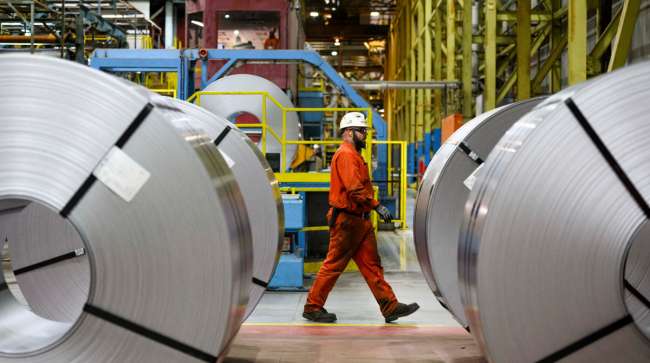Call for Action on Steel Tariffs
The CEO of Cleveland-Cliffs has urged Canada to consider implementing higher tariffs on steel imports to protect its domestic steel industry. This advocacy is particularly relevant amidst ongoing discussions about trade policies and their effects on regional economies.
The Argument for Protective Measures
Lourenco Goncalves, at the helm of Cleveland-Cliffs Inc., presented a passionate case to Prime Minister Mark Carney advocating for substantial trade protections for Canada’s steel sector. The pressing concern is the substantial volume of foreign steel that is entering the market, potentially jeopardizing domestic manufacturers. Goncalves emphasized the importance of stepping up and doing what is necessary for Canada, drawing a line on how he perceives foreign competition is affecting local producers. He remarked, “Canada can fix themselves. They import an amount of steel into Canada that’s equivalent to the size of the Canadian market.”
Context of the Steel Industry
Steel is a vital component in various industries, including construction and manufacturing, and serves as a backbone for economic growth. The concern over foreign imports is not solely about losing market share but also about sustaining jobs and ensuring that domestic production capacity remains robust.
Here’s a table summarizing key concerns related to steel import tariffs:
| Issue | Impact |
|---|---|
| Job Security | Potential job losses due to competition from cheaper imports. |
| Market Stability | Import saturation can lead to volatility in domestic pricing. |
| Investment in Local Industry | Protective tariffs may encourage reinvestment in domestic mills. |
A Call for Domestic Support
In his recent earnings call, Goncalves highlighted his commitment to Canada’s steel production by referencing his acquisition of Stelco, one of the largest steelmakers in the country. He believes that Canada should take proactive steps to safeguard its manufacturing capabilities and foster an environment conducive to investment. His comments indicate a desire for change and growth within the domestic industry, lamenting that Canadian politicians might not be sharing the same vision.
This is a crucial moment for the Canadian steel market, especially since it is the largest foreign supplier of steel to the United States. Goncalves pointed a finger at foreign imports but notably did not mention American steel imports in his concerns. This highlights a calculated focus on preserving Canada’s own production capabilities while navigating complex international trade relations.
The Evolving Trade Landscape
As discussions around tariffs heat up, the Canadian government finds itself balancing its international trade commitments with its domestic production needs. The push for higher tariffs coincides with Canada’s attempts to negotiate lower tariff levels with the U.S., indicating a multifaceted approach to addressing trade issues.
Canada’s recent decision to reduce foreign steel amounts that can enter tariff-free underscores this challenge. It shows a recognition of the strains that tariffs imposed by the U.S. have caused to local producers, sparking a call for various protective measures.
How Tariffs Affect Logistics and Transportation
The intense focus on steel tariffs ultimately connects back to the wider logistics landscape. An increase in tariffs may result in higher costs for construction and manufacturing, impacting the overall supply chain. A robust domestic steel market can foster local job creation and streamline logistics operations, ensuring that transportation services like those offered by GetTransport.com can operate effectively without the disruption of fluctuating steel prices.
Moreover, when companies can rely on a stable and supportive local steel industry, it minimizes delays associated with international shipping and customs that come into play when importing steel from abroad. Relying on domestic production streamlines logistics, resulting in faster deliveries and more predictable scheduling.
Privind înainte
The repercussions of calling for increased steel tariffs will likely be felt throughout the logistics and transportation sectors, placing them at the very heart of this discussion. As companies and policymakers navigate these changes, the need for reliable and cost-effective transportation solutions becomes evident. Logistics providers, like GetTransport.com, play a crucial role in facilitating these processes, ensuring goods move smoothly while accounting for changing trade landscapes.
On a global scale, these kinds of tariff discussions shape the future of international trade and transport. The implications stretch beyond individual countries, influencing global supply chains and trade agreements. Keeping a pulse on these developments allows logistics services to adapt and evolve in a constantly shifting economic environment.
While insights from others and reviews can provide valuable context, the best way to gauge the situation is through personal experience. GetTransport.com allows you to navigate the complexities of cargo transportation at competitive prices worldwide. Their conveyor of logistical solutions empowers you to make informed decisions without extra expenses or disappointments. Seek the convenience and security of sophisticated transport solutions aligned with market changes. Book your ride with GetTransport.com astăzi!
Concluzie
In conclusion, the call for protective steel tariffs in Canada highlights a critical conversation that intertwines with various logistics aspects. Fostering a solid domestic steel market can bolster local economies, streamline transportation operations, and enhance overall supply chain efficiency. GetTransport.com stands as an essential partner in this evolving landscape, providing reliable cargo solutions that meet diverse moving, delivery, and transportation needs. Whether it’s relocating items, handling large freight deliveries, or facilitating office moves, GetTransport.com is geared up to assist businesses and individuals effectively in this dynamic environment.

 Majorarea tarifelor la oțel: Implicațiile pentru industria canadiană">
Majorarea tarifelor la oțel: Implicațiile pentru industria canadiană">